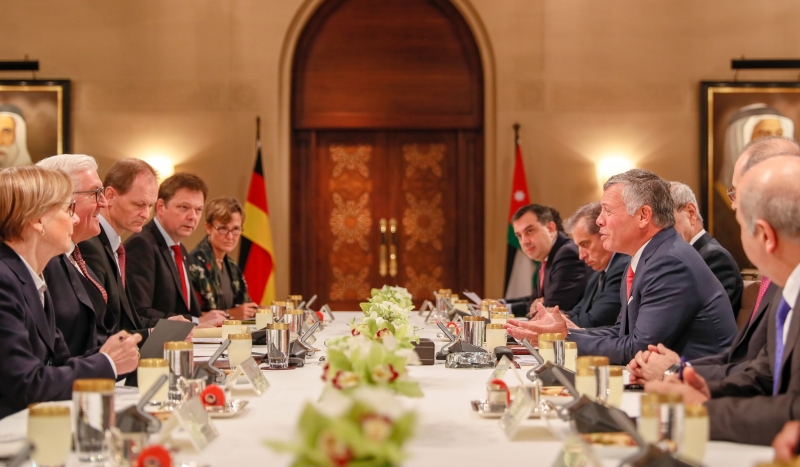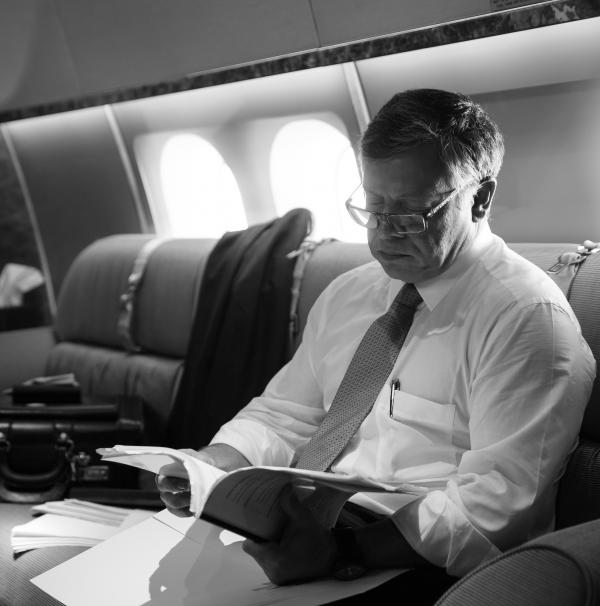King holds talks with Germany’s federal president

His Majesty King Abdullah and Federal President of Germany Frank-Walter Steinmeier held talks at Al Husseiniya Palace on Sunday, which focused on the strategic partnership between the two countries, as well as regional and international developments.
At bilateral talks, which were attended by Her Majesty Queen Rania Al Abdullah and the German president’s spouse and were followed by expanded talks attended by senior officials on both sides, discussions covered opportunities to advance Jordanian-German cooperation in the economic, investment, tourism, development, military, security, and ICT sectors.
Speaking at the start of the expanded meeting, King Abdullah welcomed Federal President Steinmeier in his new capacity as president and “as an old and dear friend of Jordan”.
Noting the strong, historical ties between Jordan and Germany, His Majesty said the relationship is steadily advancing forward.
The King cited the recent meetings with German Defence Minister Ursula von der Leyen, and in Davos with Chancellor Angela Merkel to discuss issues that Jordan and Germany see eye to eye on.
His Majesty also highlighted the development of defence and security ties between the two countries, expressing keenness to advance them further “in this day and age”.
The King expressed gratitude for the assistance that Germany provides to enable Jordan to overcome “the challenges that we are going through these days”, and “the historical support” it has offered over the years.
In addition, His Majesty noted the successful collaboration of the two countries in the field of vocational and technical education.
Praising Germany’s strong role in the region, the King said discussions at the expanded meeting will cover several regional issues, foremost of which are “Jerusalem and the fate of the peace process”.
His Majesty reiterated Jordan’s position on these issues, stressing that the Kingdom believes in a two-state solution with East Jerusalem as the Palestinian capital.
For his part, President Steinmeier said relations between Jordan and Germany “cannot be closer”, and have grown stronger in the last years.
Though this is his first visit to Jordan as president, Steinmeier said the two countries’ friendship is long lasting, highlighting His Majesty’s visit to Germany in 2016, when he received the Peace of Westphalia Prize.
President Steinmeier said Germany follows Jordan’s policy in the region “with huge respect and admiration” under difficult conditions, especially since 2011, when tens of thousands of Syrian refugees started coming to the Kingdom.
Earlier on Sunday, the German president said he visited a school where Jordanian teachers “were very engaged” with Jordanian and Syrian students alike.
“I know this is a huge burden for Jordan,” President Steinmeier added, noting that this is one of the reasons why Germany has been “ready and responsible” to support the Kingdom in shouldering this burden.
Germany is also cooperating with Lebanon, which the president said he will also be visiting, to alleviate the impact of the refugee crisis.
Noting that refugees from Syria and elsewhere now account for a substantial portion of Jordan’s population, President Steinmeier said this has exacerbated the Kingdom’s burden amidst economic difficulties in the region.
The president said discussions will also focus on regional issues, namely Palestinian-Israeli relations and the future status of Jerusalem, as well as tensions between Saudi Arabia and Iran, which affect the entire region.
Discussions at the expanded meeting covered the developments connected to the Palestinian cause and Jerusalem.
The King reaffirmed the importance of stepping up international efforts to overcome the impasse in the peace process.
His Majesty underlined that the subject of Jerusalem must be settled within the framework of a final status solution and a just and comprehensive peace agreement between the Palestinians and the Israelis, which leads to the establishment of an independent Palestinian state with East Jerusalem as its capital.
The two sides affirmed the importance of maintaining coordination and consultations on various issues of mutual concern, and in the service of achieving peace and bolstering security and stability in the region.
Talks also covered Jordan’s reform efforts and its adoption of economic reform programmes, as well as means to increase Jordanian exports to European markets by improving and expanding the agreement on the EU rules of origin, and building on it to attract new investments to the Kingdom.
Moreover, discussions addressed current regional crises and means to resolve them politically.
Royal Hashemite Court Chief Fayez Tarawneh, Foreign Minister Ayman Safadi, Director of the Office of His Majesty Jafar Hassan, Water Minister and the visiting delegation’s Escort of Honour Hazem Nasser, Planning Minister Imad Fakhoury, the accompanying delegation, Jordan’s Ambassador in Berlin Basheer Zoubi, and German Ambassador in Amman Birgitta Siefker-Eberle attended the talks.
The King, accompanied by Her Majesty, hosted an official luncheon in honour of the German president and his spouse, and the accompanying delegation.
Earlier, the German president was accorded an official welcoming ceremony at Al Husseiniya Palace.


